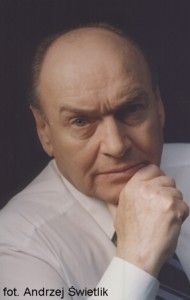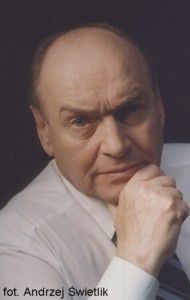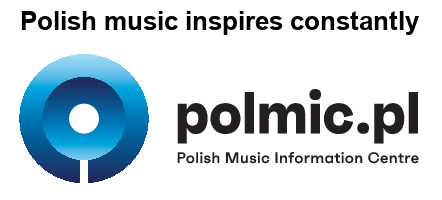Borkowski Marian
-
promoter, composer, musicologist, performer
He has been on the faculty of the Chopin Academy of Music in Warsaw since 1968, as lecturer (1968–1971), assistant professor (1971–1976), associate professor (1976–1989), full professor (since 1989); deputy dean of the Faculty of Composition, Conducting and Music Theory (1975–1978), Vice-Rector of the Academy (1978–1981, 1987–1990), head of the Chair of Music Theory (1993–1999), dean of the Faculty of Composition, Conducting and Music Theory (1996–1999), organizer and director of the Postgraduate Studies in Music Theory (1998–2008), head of the Chair of Composition (1999–2004), organizer and director of the Postgraduate Studies in Composition (2000–2008). Since 2010 he is the professor of composition class at the Feliks Nowowiejski Academy of Music in Bydgoszcz. He has given lectures and masterclasses in Amsterdam, Belgrade, Breaza, Bucharest, Cleveland, Cluj, Esztergom, Klagenfurt, Kwangju, Lyon, Mexico-City, Montreal, Moscow, Olsztyn, Paris, Québec-City, Seoul, Siena, Taegu, Tashkent, Valparaíso and Vienna.
Since 1989 he has also held visiting professorships in composition or has served as guest composer at Concordia University, Conservatoire de Musique du Québec (Québec-City), the University of Montreal, the National Conservatory of Music in Boulogne-Billancourt (Paris), the Accademia Musicale Chigiana (Siena), the University of Kansas (Lawrence), the University of Southern California (Los Angeles), San Francisco State University, Eastman School of Music (Rochester), Georgia State University (Atlanta), Tulane University of Louisiana (New Orleans), the University of North Texas (Denton), Bowling Green State University, Shenandoah University (Winchester), the University of Charleston, Rice University (Houston), the University of Miami, William Paterson University of New Jersey (Wayne), Baldwin-Wallace Conservatory (Berea, Ohio), Southwest Missouri State University (Springfield, U.S.A.), Hanyang University (Seoul), Seoul Superior Conservatory of Music, Keimyung University (Taegu), Catholic University of Taegu-Hyosung, Korean National University of Arts (Seoul), The University of Suwon, Seoul National University, and Chonnam National University (Kwangju) in Korea.
He has educated several dozen Polish composers including Joanna Badełek, Renata Baszun, Wojciech Blecharz, Marcin Błażewicz, Maria Borecka, Katarzyna Bortkun-Szpotańska, Artur Cieślak, Dorota Dywańska, Aleksandra Garbal, Szymon Godziemba-Trytek, Alicja Gronau-Osińska, Igor Jankowski, Szymon Kawalla, Jerzy Kornowicz, Aleksander Kościów, Bartosz Kowalski, Renata Kunkel, Dariusz Łapiński, Paweł Łukaszewski, Marcin Tadeusz Łukaszewski, Emilian Madey, Aldona Nawrocka, Ryszard Osada, Grażyna Paciorek-Draus, Maria Pokrzywińska, Paweł Przezwański, Roman Rewakowicz, Jędrzej Roch-Rochecki, Piotr Spoz, Paweł Sprync, Paweł Strzelecki, Łucja Szablewska, Dariusz Szankin, Wojciech Szmidt, Seweryn Ścibior, Hadrian Filip Tabęcki, Marek Towiański, Tadeusz Trojanowski, Marcin Wierzbicki, Sławomir Wojciechowski, Sławomir Zamuszko, Maciej Zieliński, Maciej Żółtowski, and has also offered instruction to many foreign undergraduate, postgraduate and doctoral students, e.g. Boris Alvarado-Gutierrez (Chile), Robin Chemtov (Canada), Choi Chun-hee (Korea), Alessandra Ciccaglioni (Italy), Joe Cutler (Great Britain), Gwon Sung-hyun (Korea), Hong Jin-pyo (Korea), Kim Jin-keum (Korea), Lee Chong-man (Korea), Lee Mi-jin (Korea), Daniel Luzko (Paraguay/USA), Ginger Mayerson (USA), Paul Scriver (Canada), Tony Srouji (Canada), Brian Thompson (Canada), Fanny Tran (Belgium), Gabriel Mãlãncioiu (Romunia). His students and graduates have won over 300 awards and honourable mentions at national and international composers’ competitions.
His compositions have been performed in concerts in 25 European countries as well as in Australia, Bolivia, Canada, Chile, Columbia, Cuba, Iran, Jamaica, Japan, Kuwait, Mexico, South Korea and USA, as well as at over 100 festivals, including those in Aix-en-Provence, Berlin, Bilbao, Darmstadt, Esztergom, Geneva, Kwangju, Lisbon, Los Angeles, Lviv, Madrid, Meadville, Metz, México-City, Munich, Paris, Pusan, Salzburg, Santa Cruz, Seoul, St. Petersburg, Taegu, Utrecht, Valparaíso, Viitasaari, Warsaw and Witten. Many of his compositions were recorded for radio and television in more than 25 countries. His discography includes over 50 LPs and CDs on such labels as Acte Préalable, DUX, Global Sound Media (Seoul), GM Records, MTJ, Musica Sacra Edition, Muza, Olympia (London), Polonia Records, ProViva Intersound (Munich), Sound-Pol, Gamma CD and Veriton.
Marian Borkowski has given piano recitals in Poland, France, Italy, Canada, Great Britain, South Korea, USA, Austria and Russia. He has also recorded many of his own and other composers’ pieces for radio, television as well as on several labels.
His research output includes over 20 theoretical studies on contemporary music, notably modern compositional techniques, analysis of 20th and 21st century music, modern orchestration techniques, the time factor in new music, problems of music sonology, Webern’s compositional techniques, serial music, Polish contemporary music and the teaching of composition. He has participated in numerous conferences, symposia and festivals in Poland and abroad (over 70).
He is a member of many music organizations in Poland, Belgium, Japan and the United States. He served as a deputy chairman of the Warsaw Branch of the Polish Composers Union (1971–77). He is the founder and Artistic Director of the ‘Laboratory of Contemporary Music’ Festival (since 1985) and President of the ‘Laboratory of Contemporary Music’ Association (since 1995). He has sat on the juries of many competitions for composers and performers (Belgrade, Florence, Paris, Esztergom, New Orleans, Seoul, Suwon, Taegu, Valparaíso, Guadalajara).
Marian Borkowski is a prize winner of the Young Composers’ Competition in Warsaw (1966), the G. B. Viotti International Composers’ Competition in Vercelli (1969), the Karol Szymanowski Competition for Composers in Warsaw (1974), the International New Music Composers Competition in New York (1990), and many awards and nominations to Polish Academy of Phonography Award “Fryderyk” (1998–2012). His honours also include the Award of the Minister of Culture and Art (1976, 1980, 1982, 2004, 2008), the Silver Cross of Merit of the Republic of Poland (1977), the Silver Medal Premio Vittorio Gui (Italy, 1979), the Medal of the Chopin Academy of Music in Warsaw (1981), the Knight’s Cross of the Order of Polonia Restituta (1984), the Badge of Merit in Culture (1985), the Medal of the 40th Anniversary of People’s Poland (1985), the Commander’s Cross of the Order of Polonia Restituta (2002), the Plaque of Honour of the Chopin Academy of Music (2004), the Medal of Honour of the Pontificia Universidad Católica de Valparaíso (2004) and the and Silver Olympic Laurel (2004). He received an honorary membership of the Musica Sacra Association (2004) and the Karol Nicze Music Society (2006). In 2005 he received an honorary citizenship of the town of Pabianice. In 2008 he received an honorary award of the Polish Composers’ Union, and the Gloria Artis Silver Medal for compositional achievements. In 2009 he received The Saint Albert Award, in 2010 — the Medal of Merit for Fryderyk Chopin University of Music and Award of Author’s Association ZAiKS. He also received the “Fryderyk” Award of the Polish Academy of Phonography in the “Composer of the Year” category (2011), the Medal of the Commission of the National Education (2012), and the “Grand Prix” from the Rector of the Fryderyk Chopin University of Music in Warsaw (2012).
May 2013 (ai)
The composer’s websites: www.marianborkowski.pl and http://marianborkowski.instantencore.comCreation
And what is his music like? At the concert, there were excellent performances of the following works: Hosanna for choir and four instruments (1993), Adoramus for a capella choir (1991), Mater mea for a capella choir to words by Baczyński (1982), Regina coeli for a capella choir (1995), Pax in terra for female voice, percussion, and organ (1988), Limits for orchestra (1971), Dram for orchestra (1966), and De profundis for choir and orchestra. Performers: the Warsaw Music Academy Symphony Orchestra (conducted by Piotr Borkowski), the ATK Choir in Warsaw (conducted by Kazimierz Szymonik), the Warsaw Percussion Group, Agnieszka Zwierko-Wiercioch (mezzosoprano), Stanisław Moryto (organ), Stanisław Skoczyński (percussion), and Maciej Żółtowski (conductor’s assistant).
I know from experience how important the first impression is, especially when encountering new music, and to what extent the impression is accurate. In order to confirm the credibility of these first encounters, I listen to Marian Borkowski’s music from excellent recordings, which the composer very kindly gave to me, as well as the works from the concert and a retrospective selection. What is it about these works, especially the more recent ones from the 1990’s, which strikes me first and foremost?
What features can I distinguish here? Clarity of the sound shapes, a very concrete quality of the sound, and something that tells us that this music really exists – rather than just signifying existence. Clarity of structure. Strength and cohesion of construction. Logic of development and building. Proportionality of form. Intense expressivity resulting from the sound substance. The sacred music idiom (in the choral works). Tightness and condensation (the longest work does not exceed 15 minutes). Using every effect with clear purpose.
These are properties of classical music, in the broadest sense. But they should be all the more valued today, in the times aesthetic confusion, faltering judgements, and blurred criteria of value.
In any case, when listening to the retrospective selection of earlier works from 1960s and 1970s, I realise what kind of evolution the composer has gone through, an evolution characteristic for his generation, actually, before he reached this state of his music. And so, the later works from the 1980s and 1990s seem to be supported by experience, generally speaking, of sonorism, a widespread and versatile one, while being based on the 12-tone technique and preferences for intensely sharp sounds, aggressive, and maximally concentrated in terms of the degree of loudness; the experience of sound possibilities of various instruments: piano, organ, violin, tuba, human voice, chamber and orchestral ensembles.
Moreover, in the penetrations of various sources of sound – the natural one! – always put in a tight manner and condensed in time (here, the creative patronage of Anton Webern is clear), there is a striking richness of musical imagination: originality of ideas, variety of solutions, creative fantasy (if this word can be used here) but controlled by formal rigour based on sonic specificity (“sonoristic”) – its feel and awareness.
I would like to add that the composer’s evolution, in its direction and logic, brings to my mind the movement and shape of my favourite triad (the Hegelian Triad).
And so the sound experiences, the aesthetic of sharpness, energetically aggressive sounds, all of that sonorism, can be understood as the “thesis”. The experiences of sacred music for a capella choir – the aesthetic of saturated sound, a sounding fullness absorbing and transforming the sonoristic sharpness – this is the “antithesis”. And a wonderful synthesis: sharpness and saturation, whisper and scream, tension – a sound in the state of becoming and euphonic fullness – in the works that made the greatest impression on me: Hosanna, De profundis.
Intrigued by this new adventure of mine with contemporary music, I now ask myself this question: What does it mean to be a contemporary composer – the creator of music of one’s own time (but what does that “time” mean?), today, at the end of the 20th century and at the threshold of the third millennium?
Maybe this, and only this: Masterful command of maximal sound language, that is, one that incorporates – through absorption, adaptation, synthesis – all the most important languages worked out to date in the music of the West throughout its history, a language particularly multi-lingual which the composer moulds and adapts to his own style, thus giving form to music: coherent, logical and expressive, where, through a concrete and sensual shape, a spiritual interior can be glimpsed...”
“Ruch Muzyczny” 1999 No. 5
Composer’s reflection
In my composing career one can notice a great variety of musical species. There are many instrumental, solo, chamber and orchestral pieces, next to vocal (songs and a cappella choruses) and mixed, vocal- instrumental ones.
Chronologically speaking four distinct periods are clearly discernible:
1. up to year 1962, marked by neostyles and folkloristic inspirations,
2. 1962-1971 period of experimenting with a novel organization of musical time (the so-called isochronic division) which influenced the structuring of tonal resources, original search for new sonoric, textural and formal qualities as well as deepening of the emotional charge,
3. 1972-1981 continuing search for new stylistic features by means of enriching it with aleatoric, freely sonoric, multiple constructivistic structures, new type of musical notation. At the same time took place a reduction of the number of performers without losing full sound qualities and careful selection of expressive means,
4. after 1982 – a definite shift towards sacral connotations in musical orientation accompanied by increased symbolism, condensation and homogenization of musical matter paralleled by intense musical expression and dramatic tension.
In my own eyes, that period results in an esthetically and stylistically distinct musical language. Among its chief characteristics are: emotion, dynamic tension, dramatic presentation, symbolic and aphoristic narration. Moreover, all these means are subservient to the governing artistic idea. My aim is to select very carefully all the means of artistic expression and to apply them judiciously in each individual work.
It is the matter of architectonic precision closely connected with the expressive strata, exploiting the sonoric and expressive capacities of both vocal and instrumental resource, and, finally, a close relationship between musical notation and time, as well as, the desired sound. The latter, in turn, is determined by the scale of dynamic articulation sound quality and its volume. Worth mentioning is also polarization of sonoric contrasts which results in obtaining monumental effects in spite of chamber-like means.
To sum up – my music may be best described as being par excellence dynamic and expressive while in terms of art philosophy I profess sincerely ethical approach in terms of high humanist ideals combined with romantic spirit in life and artistic endeavors. My guideline in artistic endeavors is introspection, i.e., to be true to oneself, ones gifts and abilities.
(transl. by Jerzy Gołos)
„Musica Sacra Nova” 2007 No. 1
Compositions
Two Mazurkas for piano (1958)
Variations for piano (1959)
Toccata for piano (1960)
Sfere for chamber orchestra (1961)
Sonata for piano (1961)
Fragmenti for piano (1962)
Visions I for solo cello (1962)
Lyrical Preludes for soprano and piano, with words by Konstanty I. Gałczyński (1962)
Aria for soprano and 7 instruments (1963)
Acclamations for 4 choirs, 6 instrumental groups and organ, a setting of Byzantine texts (1964)
Dram for orchestra (1966)
Epitaphium for female choir and instrumental ensemble (1968)
Lullaby for a cappella mixed choir (1970)
Limits for orchestra (1971)
Children’s Christmas carol for alto, baritone, mixed choir and organ, with works by Józef Szczawiński (1971)
Selection for 5 for chamber ensemble (1972)
Images I for any solo voice (1973)
Comes for chamber ensemble (1974)
Psalmus for organ (1975)
Norwidiana 75 for female voice and chamber ensemble (1975)
Images II for any solo string instrument (1975)
Romantic Interludes for piano (1976)
Variant for instrumental ensemble (1976)
Speranza for flutes and piano (1976)
Vox for any solo wind instrument (1977)
Dialoghi for 2 pianos (1977)
Mont for orchestra (1978)
Spectra for solo percussion (1980)
Dynamics I for 6 percussionists (1981)
Mater mea for a cappella mixed choir, with words by Krzysztof K. Baczyński (1982)
Appasionante for 2 instruments (string and brass) (1983)
Avante for violin, tuba and piano (1984)
Concerto for any string instrument and orchestra (1985-86)
Pax in terra I for female voice, 4 guitar groups and tubular bells (1987)
Pax in terra II for female voice, percussion and organ (1988)
Prologue for trumpet and organ (1990)
Adoramus for a cappella mixed choir (1991)
Ritornel for orchestra (1992)
Hosanna I for mixed choir and 4 instruments (1993)
Regina caeli for a cappella mixed choir (1995)
Christmas carol I for a cappella mixed choir, with works by Anna Bernat and Jan Węcowski (1995)
Kassándra for female voice, mixed choir and orchestra (1996-97)
De profundis for mixed choir and orchestra (1998)
Symphony No. 3 – Requiem for mixed choir and symphony orchestra (1998-2011)
Metallica for brass quintet (1999)
Ave. Alleluia. Amen I for a cappella mixed choir (2000)
Con-Son for string orchestra (2001)
Dix for brass quintet (2002)
Visions II for string orchestra (2003)
Visions III for string quartet (2003)
Symphony No. 1 – Dies irae for mixed choir and symphony orchestra (2004)
Hymnus for mixed choir and symphony orchestra (2005)
Libera me for a cappella mixed choir (2005)
Symphony No. 2 – Hymnus for mixed choir and symphony orchestra (2005-2009)
Sonus for instrumental ensemble (2006)
Pax in terra III for female choir, strings and percussion (2007)
Lux aeterna for mixed choir and symphony orchestra (2008-2011)
Sanctus for a cappella mixed choir (2009)
Hosanna II for mixed choir and symphony orchestra (2009)
Christmas carol II for bass and mixed choir, with works by Anna Bernat and Jan Węcowski (2010)
Dynamics II for six percussionists (2010)
Lux for a cappella mixed choir (2010)
Pater noster for a cappella mixed choir (2011)
Ave. Alleluia. Amen II for six male voices (2011)
Cantus for six saxophones (2012)
Lullaby II for a cappella mixed choir (2012)
Gloria I for a cappella female choir (2012)
Gloria II for a cappella mixed choir (2012)
Ave. Alleluia. Amen III for vocal sextet (2013)
Libera me II for a cappella female choir (2013)
Publications
articles & papers
Zagadnienie formy muzycznej w utworach dodekafonicznych Weberna [The problem of musical form in dodecaphonic works by Webern], „Res Facta” nr 6, PWM, Kraków 1972
Jugosłowiańska Trybuna Kompozytorska – Opatija 1972 [The Yugoslav Composers’ Tribune – Opatija 1972], „Ruch Muzyczny” 1973 nr 4
Rozmowa z kompozytorem, z Marianem Borkowskim rozmawia Zbigniew Bargielski [wywiad], „Literatura” 1973 nr 12/58, s. 12
Wzbogacić samego siebie [To enrich oneself], z Marianem Borkowskim rozmawia Elżbieta M. Terlega [conversation with Marian Borkowski conducted by Elżbieta M. Terlega], „Poradnik Muzyczny” 1986 nr 2, s. 1-3
The role of the twelve-tone row in the development of modern Polish music, Contemporary Music Society Edition, Seul 1988
Relacje z Ameryki, z profesorami Marianem Borkowskim i Andrzejem Dutkiewiczem rozmawia Edward Dulski [wywiad], „Przegląd Muzyczny” 1991 nr 2-3, s. 14-16
Legnickie ósme organowe, Rozmowa z prof. Marianem Borkowskim, kompozytorem i wykładowcą w Akademii Muzycznej w Warszawie [wywiad], „Słowo Polskie” 1993 nr 254
O myśleniu muzycznym (dwa utwory Stanisława Moryto) [On musical thinking (two works of Stanisław Moryto)], „Heksis” 1995 nr 2(3), s. 26-28
Nowy program teorii muzyki (ogólne założenia i plan studiów) [New curriculum of music theory (general goals and plan of studies)], „Heksis” 1996 nr 3, s. 63-70
Elementy mojego języka muzycznego [Elements of my musical language], In: I Sympozjum Kompozytorskie Akademii Muzycznej im. F.Chopina (pod red. Alicji Gronau-Osińskiej) [The 1st Composition Symposium of the Fryderyk Chopin Academy of Music (ed. by Alicja Gronau-Osińska)], Wydawnictwo AMFC, Warszawa 1999
My musical language (in Korean), In: The Book of the 1st International Seminar for the Contemporary Music, Kwangju (Korea Południowa) 1999
Serial Structuring in Webern’s Dodecaphonic Compositions, In: The Book of the 1st International Seminar for the Contemporary Music, Kwangju (Korea Południowa) 1999
O sztuce kompozycji. I i II Refleksja [On the art of composition. Reflections I and II], „Quo Vadis” 2002 nr 1, s. 22-23
Akt twórczy kompozytora. Refleksja III [The composer’s creative act. Reflection III], „Quo Vadis” 2003 nr 1-4, s. 59
Glosa, In: Potencjał kompozycyjny utworów na instrumenty solowe. III Sympozjum Kompozytorskie Akademii Muzycznej im. F. Chopina (pod red. Mariana Borkowskiego) [The compositional potential of works for solo instruments – The 3rd Compositi], Wydawnictwo AMFC, Warszawa 2003
Laboratorium Muzyki Współczesnej: 1985-2003, z prof. Marianem Borkowskim rozmawia Marcin Tadeusz Łukaszewski [wywiad], program X Festiwalu, Warszawa 2003
Zagadnienie strukturowania seryjnego w twórczości dodekafonicznej Weberna [Serial structuring in Webern’s dodecaphonic compositions], In: Teksty o muzyce współczesnej (pod red. Mariana Borkowskiego) [Texts on contemporary music (ed. by Marian Borkowski)], Wydawnictwo AMFC, Warszawa 2004
O studiach, pedagogice i sztuce kompozycji refleksji kilka [Studies, pedagogy and art of composition], In: IV Sympozjum Kompozytorskie Akademii Muzycznej im. Fryderyka Chopina (pod red. Alicji Gronau-Osińskiej) [The 4th Composition Symposium of the Fryderyk Chopin Academy of Music (ed. by Alicja Gronau-Osińska)], vol. I, Wydawnictwo Akademii Muzycznej im. F. Chopina w Warszawie, Warszawa 2006
Pięć refleksji o sztuce kompozycji [Five reflections on the art of composing], „Musica Sacra Nova” nr 1, Warszawa 2007
Muzyczne podróże Mariana Borkowskiego – 1972 [Musical journeys of Marian Borkowski – 1972], conversation with composer conducted by Krzysztof Baculewski, „Musica Sacra Nova” 2008 nr 2, s. 191-198
Problem harmoniki w „Miniaturach” Artura Malawskiego [The problem of harmony in “Miniatury” by Artur Malawski], In: Z zagadnień muzyki XX i XXI wieku (pod red. Marcina Tadeusza Łukaszewskiego) [From the problems of 20th- and 21st-century music (ed. by Marcin Tadeusz Łukaszewski)], „Musica Sacra Nova” nr 3-4, Warszawa 2009
Typologia serii Weberna, [praca przygotowana do druku w „Musica Sacra Nova” 2012 nr 6], Warszawa 2012
Literature
Borkowski Marian. In: The American Biographical Institute, Inc., Raleigh (North Carolina, USA): Five Hundred Leaders of Influence, 5 000 Personalities of the World, The International Directory of Distinguished Leadership, The Contemporary Who’s Who
Kobierzycki Tadeusz, Wielopoziomowość muzyki. Studium o muzyce Mariana Borkowskiego [The multi-layer aspect of music. A study in Marian Borkowski’s music], In: Muzyka i Psychika (pod red. Tadeusza Daszkiewicza i Tomasza Szafrańskiego) [Music and Psyche (ed. by Tadeusz Daszkiewicz and Tomasz Szafrański)], Wydawnictwo “Stakroos”, Warszawa 1994
Lindstedt Iwona, Borkowski Marian, In: Encyklopedia Muzyczna PWM (część biograficzna pod red. Elżbiety Dziębowskiej) [The PWM Music Encyclopaedia (biographical part, ed. by Elżbieta Dziębowska)], vol. “ab – Supplement”, PWM, Kraków 1998
Borkowski Marian. In: The International Biographical Centre, Cambridge, England: Dictionary of International Biography, International Leaders in Achievement, International Who’s Who of Intellectuals, International Who’s Who in Music, International Who’s Who in Community Service, Men of Achievement, International Who’s Who in Music and Musicians’ Directory, The World Who’s Who of Musicians, The 2000 Outstanding Intellectuals of the 21st Century, 5000 Personalities of the World
Borkowski Marian, In: Encyklopedia Muzyki (pod red. Andrzeja Chodkowskiego) [The Encyclopaedia of Music (ed. by Andrzej Chodkowski)], 2nd edition, Wydawnictwo Naukowe PWN, Warszawa 2001
Borkowski Marian, In: Wielka Encyklopedia PWN (pod red. nacz. Jana Wojnowskiego) [The PWN Great Encyclopaedia (ed. by Jan Wojnowski)], vol. 4, Wydawnictwo PWN, Warszawa 2001
Borkowski Marian, In: Złota Księga Nauki Polskiej 2000 – Naukowcy Przełomu Wieków (pod red. Krzysztofa Pikonia) [The Golden Book of Polish Research 2000 – Scholars of the Turn of the Centuries (ed. by Krzysztof Pikoń)], Wydawnictwo “Helion”, Gliwice 2001
Łukaszewski Marcin Tadeusz, Faktura – brzmienie – ekspresja w twórczości chóralnej i wokalno-instrumentalnej Mariana Borkowskiego [Texture – sound – expression in Marian Borkowski’s choral and vocal-instrumental works], In: Muzyka Chóralna. II Sympozjum Kompozytorskie Akademii Muzycznej im. F. Chopina (pod red. Alicji Gronau-Osińskiej) [Choral Music – The 2nd Composition Symposium of the Fryderyk Chopin Academy of Music (ed. by Alicja Gronau-Osińska)], Wydawnictwo Akademii Muzycznej im. F. Chopina w Warszawie, Warszawa 2001
Borkowski Marian, In: Who is Who w Polsce. Leksykon biograficzny [Who is Who in Poland. Biographical lexicon], 1st edition, vol. 1, Hübners Who is Who, Verlag für Personenenzyklopädien AG, Zug 2002
Łukaszewski Marcin Tadeusz, Utwory na instrumenty solowe Mariana Borkowskiego. Próba charakterystyki wartości instrumentalnych i stylotwórczych [Marian Borkowski’s works for solo instruments. An attempt to describe the instrumental and style-generating values], In: Potencjał kompozycyjny utworów na instrumenty solowe. III Sympozjum Kompozytorskie Akademii Muzycznej im. F. Chopina (pod red. Mariana Borkowskiego) [The compositional potential of works for solo instruments – The 3rd Composition Symposium of the Fryd, Wydawnictwo Akademii Muzycznej im. F. Chopina w Warszawie, Warszawa 2003
Borkowski Marian, In: Złota Księga Nauk Humanistycznych 2004 (pod red. Krzysztofa Pikonia) [The Golden Book of the Humanities (ed. by Krzysztof Pikoń)], Wydawnictwo „Helion”, Gliwice 2004
Ekspresja formy – ekspresja treści [The expression of form – the expression of content], Marianowi Borkowskiemu w siedemdziesięciolecie urodzin (Księga Jubileuszowa pod red. Alicji Gronau-Osińskiej) [To Marian Borkowski on his 70th birthday (The Jubilee Book, ed. by Alicja Gronau-Osińska)], Akademia Muzyczna im. F. Chopina w Warszawie, Warszawa 2004
Borkowski Marian, In: Who’s Who in the World – Encyklopedia Actus Purus. Kto jest kim w Polsce (pod red. Macieja Romana Bombickiego) [Who’s Who in the World – Actus Purus Encyclopaedia. Who’s Who in Poland (ed. by Maciej Roman Bombicki)], vol. I, Polska Narodowa Oficyna Wydawnicza, Poznań 2004
Łukaszewski Marcin, Borkowski Marian, In: Kompozytorzy polscy 1918-2000 (pod red. Marka Podhajskiego) [Polish Composers 1918-2000 (ed. by Marek Podhajski)], vol. II (Biographical notes), Akademia Muzyczna w Gdańsku, Akademia Muzyczna w Warszawie, Gdańsk - Warszawa 2005
Łukaszewski Marcin Tadeusz, Borkowski Marian, In: Almanach Kompozytorów Akademii Muzycznej im. F. Chopina (pod red. Alicji Gronau-Osińskiej) [Almanac of composers of the Fryderyk Chopin Academy of Music (ed. by Alicja Gronau-Osińska)], 2nd edition, Akademia Muzyczna w Warszawie, Warszawa 2006
Borkowski Marian, In: Złota Księga Nauki Polskiej – Naukowcy Zjednoczonej Europy (pod red. Krzysztofa Pikonia) [The Golden Book of Polish Research – Scholars of the United Europe (ed. by Krzysztof Pikoń)], Wydawnictwo „Helion”, Gliwice 2006
Borkowski Marian, In: Współcześni uczeni polscy. Słownik biograficzny (pod red. Janusza Kapuścika) [The contemporary Polish scholars. Biographical dictionary (ed. by Janusz Kapuścik)], vol. V, supplement A-Ż, Ośrodek Przetwarzania Informacji, Warszawa 2006
Borkowski Marian, In: Leksykon Polskich Muzyków Pedagogów (pod red. Katarzyny Janczewskiej-Sołomko) [The Lexicon of Polish Musicians-Teachers (ed. by Katarzyna Janczewska-Sołomko)], Oficyna Wydawnicza „Impuls”, Kraków 2008
Gronau-Osińska Alicja, Działalność pedagogiczna Mariana Borkowskiego (z aneksem) [Marian Borkowski’s pedagogical work (with appendix)], In: Studia nad twórczością Mariana Borkowskiego (pod red. Marcina Tadeusza Łukaszewskiego) [Studies in Marian Borkowski’s works (ed. by Marcin Tadeusz Łukaszewski)], Warszawa 2008
Łukaszewski Marcin Tadeusz, Kalendarium życia, twórczości i działalności Mariana Borkowskiego [Chronology of Marian Borkowski’s life, work, and activities], In: Studia nad twórczością Mariana Borkowskiego (pod red. Marcina Tadeusza Łukaszewskiego) [Studies in Marian Borkowski’s works (ed. by Marcin Tadeusz Łukaszewski)], „Musica Sacra Nova” nr 2, Warszawa 2008
Studia nad twórczością Mariana Borkowskiego (pod red. Marcina Tadeusza Łukaszewskiego) [Studies in Marian Borkowski’s works (ed. by Marcin Tadeusz Łukaszewski)], „Musica Sacra Nova” nr 2, Warszawa 2008
Borkowski Marian, In: International Who’s Who in Classical Music 2010 (ed. by Robert J. Elster), 26th Edition, Europa Biographical Reference Series, Routlege (Taylor a. Francis Group), London - New York 2010
Kobierzycki Tadeusz, Maj Filip, Vitalism and Existentialism in Marian Borkowski’s Music, "Heksis” 2010 nr 2 (www.heksis.com)
Borkowski Marian, In: Who’s Who in the World 2013, 30th Edition (Classic), Marquis Who’s Who, New Provodence (New Jersey, USA) 2012
Discography
LP
Children’s Christmas carol – Veriton SXV 772 (1975)
3 Andersen’s Fables – Veriton SXV 805 (1978)
Romantic Interludes – Veriton SXV 806 (1979)
Vox – ProViva ISPV 102 (1980)
Dialoghi – Veriton SXV 817 (1981)
Vox – Polskie Nagrania • Muza SX 1806 (1982)
Christmas carol I / Christmas carol II – Veriton SXV 896 (1984)
Mater mea – Veriton SXV 897–898 (1985)
Images II – Polskie Nagrania • Muza SX 2459 B (1986)
Speranza / Fragmenti / Spectra / Images II – ProViva ISPV 137 (1987)
Psalmus – Veriton SXV 882 (1987)
Speranza – Veriton SXV 870 (1987)
Fragmenti – Polskie Nagrania • Muza SXL 0827 (1987)
CD
Fragmenti – Olympia Compact Discs Ltd. OCD 316 (1989)
Romantic Interludes / Dialoghi – Olympia Compact Discs Ltd. OCD 394 (1993)
Pax in terra II – Polonia Records CD 020 (1994)
Spectra – Polonia Records CD 027 (1994)
Images II – Polonia Records CD 028 (1994)
Regina caeli – DUX 0251 (1996)
Christmas carol I – DUX 0275 (1996)
Christmas carol I / Christmas carol II – Gamma GCD 017 (1997)
3 Andersen’s Fables – MTJ 022 (1997)
Christmas carol I / Christmas carol II – GM Records GMM 253–2 (1998)
Adoramus – DUX 0108 (1998) (Nomination to Polish Academy of Phonography Award “Fryderyk – 1998”)
Psalmus – Acte Préalable AP 0005 (1998)
Norwidiana 75 – Acte Préalable AP 0008 (1998)
Fragmenti – Keimyung University CD (1999)
Toccata/Fragmenti – Acte Préalable AP 0016 (1999)
Pax in terra II / Limits / Adoramus / Regina caeli / Variant / Hosanna I / Dram / De profundis – Acte Préalable AP 0038 (1999)
Toccata – MT 2006/6 (2000)
Dram / Hosanna I / De profundis – PBR CD-R 001 (2000)
De profundis / Selection for 5 – Acte Préalable AP 0011/12 (2001)
Hosanna I – Acte Préalable AP 0098 (2001)
Ave • Alleluia • Amen – Acte Préalable AP 0100 (2001) (Nomination to Polish Academy of Phonography Award “Fryderyk – 2001”)
Variant – Global Sound Media CD 001 (2002)
Variant – DUX 0393 (2002) (Nomination to Polish Academy of Phonography Award “Fryderyk – 2002”)
Images III – Acte Préalable AP 0107 (2004) (2 Nominations to Polish Academy of Phonography Award “Fryderyk – 2004”)
Ave • Alleluia • Amen – Acte Préalable AP 0100 (2004) (2 Nominations to Polish Academy of Phonography Award “Fryderyk – 2004”)
Vox / Dram – Acte Préalable AP 0109 (2004) (Nomination to Polish Academy of Phonography Award “Fryderyk – 2004”)
Pax in terra II – Acte Préalable AP 0133 (2005) (2 Nominations to Polish Academy of Phonography Award “Fryderyk – 2005”)
Psalmus – DUX 0522–23 (2005) (Nomination to Polish Academy of Phonography Award “Fryderyk – 2005”)
Dies irae – Acte Préalable AP 0197 (2005)
Speranza / Selection for 5 / Norwidiana 75 – The Mystery of the writing CD (2006)
Prolog / Toccata / Images II / Psalmus / Dialoghi / Vox / Visions I / Fragmenti / Speranza / Spectra – Musica Sacra Edition MSE 010 (2006)
Dies irae – Musica Sacra Edition MSE 011 (2006) (2 Nominations to Polish Academy of Phonography Award “Fryderyk – 2006”)
Libera me – Musica Sacra Edition MSE 018 (2008) (Nomination to Polish Academy of Phonography Award “Fryderyk – 2009”)
Hymnus / Pax in terra II / Adoramus / Regina caeli / De profundis / Ave • Alleluia • Amen / Libera me / Hosanna I / Dies irae – Musica Sacra Edition MSE 020 (2008) (2 Nominations to Polish Academy of Phonography Award “Fryderyk – 2009”)
Sanctus – MFMS „Gaude Mater” / Polskie Radio Program II, CD (2009)
Christmas carol II – Musica Sacra Edition MSE 027 (2010) (“Fryderyk” Award of the Polish Academy of Phonography – 2011”)
Limits / Selection for 5 / Variant / Visions II / Dynamics II / Norwidiana 75 / Dram – Musica Sacra Edition MSE 030 (2010) (2 Nominations to Polish Academy of Phonography Award “Fryderyk – 2011”)
Ave • Alleluia • Amen – Musica Sacra Edition MSE 028 (2011)
Mazurka – DUX 0795 (2011)











